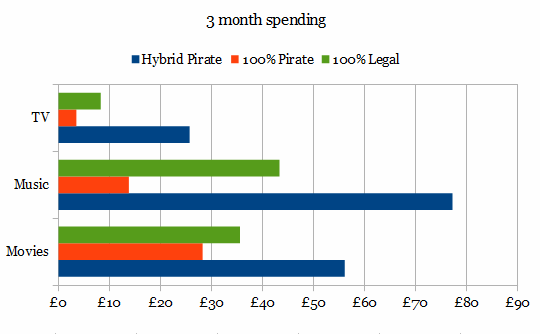Illegal Downloaders Spend More on Music, Film and TV Than Legal Downloaders
Those who illegally download music, films and television programmes spend more money on entertainment purchases than those who never access pirated material, Ofcom research has found.

The UK-wide survey asked 4,400 people aged 12 and over about their downloading habits and found that those who download both legal and illegal content spent more money on the entertainment industry than those who always purchase content legally.
The graph below shows spending habits of those questioned and is broken down into TV, music and movies - it is worth pointing out that these categories include all purchases related to them, such as cinema tickets, concerts, DVDs, CDs and other merchandise.

One in six of the UK population downloaded pirated material between May and July this year, and a quarter of this group said they consumed only pirated content, avoiding paying for media entirely.
This means the remaining three quarters of pirates are described as "hybrids", as they download both legally and illegally.
The 4,400 recipient were also asked how much they feel a music track is worth, and again the results were higher for hybrid users, who suggested a price of 76p, while those who pirate nothing decided that a music track is worth 72p.
Film downloads
The same is true for film downloads, where the hybrids suggested an average value of £4.92, compared to £3.74 from the group of non-pirating users.
When asked why they download pirated content 54 percent said because it is free, 48 percent said they pirate because it is convenient, and 44 percent said because it is quick.
Just over a quarter of infringers also said they do it because it means they can try films aand music tracks before they buy them.
Factors that would encourage them to stop infringing included the availability of cheaper legal services (39 percent) or if everything they wanted was available online (32 percent). Finally, 26 percent of those asked said they would pirate less if it was clearer what is legal and what isn't.
The vast majority of those who consumed music illegally online were male (60 percent), under 34 (79 percent) and of socio-economic groups ABC1 (59 percent).
Earlier this week, it was reported that Finnish anti-piracy police had confiscated a nine-year-old girl's Winnie The Pooh laptop after it was found she had tried to download a pirated album. Her father explained that he bought the album for her when they found the pirated copy didn't work.
© Copyright IBTimes 2025. All rights reserved.




















